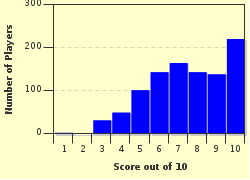Quiz Answer Key and Fun Facts
1. Which creature of Greek myth was bitten by a gadfly after flying too close to the heavens?
2. Which rather obscure Greek deity was known as Zeus' fly-swatter?
3. One of the few places where flies could be seen as positive symbols was in ancient Egypt. Here, large golden flies were given as awards. For what reason were these symbols awarded?
4. Which "fly" was thought by the Mayans to carry the light of the stars, the Japanese to carry the souls of warriors, and the Chinese to be the companions of nocturnal scholars?
5. Which troublesome god of Norse myth transforms himself into a fly in several myths in order to cause nuisance?
6. Demon of rotting corpses in Greek myth, Eurynomus is predictably linked with flies. To what other creature is Eurynomus linked?
7. Which figure, originally of Syrian mythology, has come to have strong religious links and is usually depicted as a fly?
8. A myth known as "Journey to the West" tells us of how the Monkey King would take the form of a fly to escape dangers during his travels. From which country does this tale originate?
9. Which mythological figure, in the form of a white cow, was said to be pursued around the Mediterranean by a gadfly sent by an angry deity?
10. The mythology of the Montagnais of Canada provides us with a story of a fly which guarded its lake from fishermen. What name was given to this vigilant fly?
Source: Author
doublemm
This quiz was reviewed by FunTrivia editor
CellarDoor before going online.
Any errors found in FunTrivia content are routinely corrected through our feedback system.

